|
|
|
Sort Order |
|
|
|
Items / Page
|
|
|
|
|
|
|
| Srl | Item |
| 1 |
ID:
107064
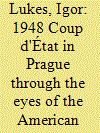

|
|
|
|
|
| Publication |
2011.
|
| Summary/Abstract |
This article examines the dramatic events that transformed Czechoslovakia into a totalitarian dictatorship primarily from the perspective of the United States Foreign Service officers posted at the American Embassy in Prague. It is based on new archival sources, on interviews with former American Foreign Service and Intelligence officers, and on their unpublished mémoires.
|
|
|
|
|
|
|
|
|
|
|
|
|
|
|
|
| 2 |
ID:
107065
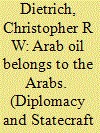

|
|
|
|
|
| Publication |
2011.
|
| Summary/Abstract |
Drawing from material in American and British national archives, the Johnson and Nixon presidential libraries, the archives of the International Monetary Fund, and the United Nations record, this article examines the international politics surrounding the June 1972 nationalisation of the Iraq Petroleum Company. The response to the nationalisation reveals a complex relationship between traditional Cold War concerns and the emergence of a Third World challenge to the structure of the post-war international economy: the practice of raw material sovereignty. Although Soviet aid to the Ba'ath government was central to nationalisation, it was far from exclusive. Accordingly, the nationalisation illustrates the dynamism of the Cold War era and places on display important forces that operated independently of Cold War constraints.
|
|
|
|
|
|
|
|
|
|
|
|
|
|
|
|
| 3 |
ID:
107059
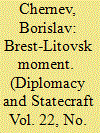

|
|
|
|
|
| Publication |
2011.
|
| Summary/Abstract |
The article argues that the historical origins of the concept of self-determination had less to do with Woodrow Wilson than with the specific circumstances during the last phase of the Great War. It argues that self-determination became the "centre of the discourse of legitimacy in international relations" as a result of a dynamic process involving multiple actors. Lenin and the Bolsheviks first started to employ the concept. Self-determination discourse gained further momentum during the Brest-Litovsk peace conference, where the Austro-German and Russian delegations debated its application at some length. This prompted Allied statesmen to crystallise their ideas and make self-determination their principal war aim. The increasing appeal of self-determination first manifested itself in the entangled spaces of Eastern Europe, where the national aspirations of Poles and Ukrainians, bolstered by the new discourse, converged with the rhetoric emanating from Brest-Litovsk to create a "Wilsonian moment" before Wilson.
|
|
|
|
|
|
|
|
|
|
|
|
|
|
|
|
| 4 |
ID:
107071
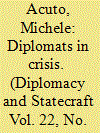

|
|
|
|
|
| Publication |
2011.
|
| Summary/Abstract |
Although "international crisis" is a widespread term, no common definition has yet been achieved: its features have neither been clarified in relation to contemporary events, nor has the role of diplomacy in relation to crises been outlined with precision. Diplomats have even become part of the problem, rather than the problem-solvers, as realist approaches have lost touch with today's poly-lateral world politics. To make up for these lacunae, this article enquires into the present-day nexus between international crisis and diplomacy by first illustrating what international crises mean beyond traditional state-centric definitions and then by considering what diplomacy can offer to tame such turbulent disruptions to the routine of world affairs. In doing so, it introduces a critical definition of international crisis and tests it in relation to a system-oriented description of diplomacy both in its routine and crisis dimensions. Outlining the role of "crisis diplomacy" beyond "diplomatic crises" the essay calls for both a novel understanding of the role of diplomats in these contexts and a greater awareness to the growing complexity of such engagements.
|
|
|
|
|
|
|
|
|
|
|
|
|
|
|
|
| 5 |
ID:
107061


|
|
|
|
|
| Publication |
2011.
|
| Summary/Abstract |
From 1931 to 1941, when China and Japan were at undeclared war, China's propaganda was fairly well-circulated in America through her American friends who played a leading role in shaping American opinions on the Far Eastern crisis. But the United States State Department maintained a neutral stance toward the Sino-Japanese conflict until after 1939 and considered the pro-Chinese opinion not so much a national consensus for policy consideration as a partisan view propped up by propaganda groups. Thus, the State Department guarded its Asian policy from the pressure of propaganda activities and partisan opinions on the Asian conflict, whilst utilising them occasionally as tools of diplomacy toward China and Japan. This article examines the State Department's attitude toward public opinion and propaganda on the Far Eastern conflict from 1931 to 1941 to illustrate how American officials handled partisan opinions on a foreign crisis when most of the information on foreign policy was privately initiated and circulated.
|
|
|
|
|
|
|
|
|
|
|
|
|
|
|
|
| 6 |
ID:
107067


|
|
|
|
|
| Publication |
2011.
|
| Summary/Abstract |
The International Military Tribunal for the Far East (1946-1948) or Tokyo IMT is overlooked for its contributions to modern international criminal justice. Convened to hold Japanese leaders accountable for conspiring to commit aggression, crimes against peace, crimes against humanity, and war crimes during the Second World War, the IMTFE was both a groundbreaking judicial undertaking and a pioneering multilateral institution. This distinction makes it a unique vehicle for exploring the fundamental challenges of both international justice and organisation. Institutions like the IMTFE are usually viewed through broad geopolitical, legal, and ideological lenses. Although important, these approaches miss a singularly important dimension of multilateralism: the human contingencies that impact international bodies. Using unique participant sources, this article presents an intimate "trial's-eye-view" of how working at the IMTFE affected the emotions, psychology, and temperament of its personnel. Participant responses on these very personal levels had profound consequences on the tribunal's proceedings, findings, and legacy. Other factors shaped justice in Tokyo, but the responses identified here were common, and their impact significant. Ultimately, this paper argues that people and their experiences-as much as anything-produced the outcome of justice in Tokyo.
|
|
|
|
|
|
|
|
|
|
|
|
|
|
|
|
| 7 |
ID:
107062
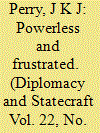

|
|
|
|
|
| Publication |
2011.
|
| Summary/Abstract |
Foreign policy is multi-faceted. It was not only diplomatic, political, socio-cultural, economic, Imperial, and strategic factors that structured-and limited-Britain's foreign policy during the interwar period; so, too, did those of other countries. Given the number and variety of Britain's-and the interconnected other Powers'-interests in China, Britain's relationship with China during the opening years of the Second Sino-Japanese War provides a useful insight which has wider implications on Britain's road to war narrative. Given the topic's neglect, one can be forgiven for inferring that events in Europe entirely eclipsed those of East Asia. This article demonstrates the contrary. As awareness of Chinese suffering spread and as Japanese aggrandisement threatened British interests, sinophilism became vogue once again. However, the often insurmountable obstacles that the interwar period presented to Britain and others-particularly the United States-limited Britain's ability to aid China. It was not for want of fortitude.
|
|
|
|
|
|
|
|
|
|
|
|
|
|
|
|
| 8 |
ID:
107069
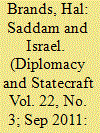

|
|
|
|
|
| Publication |
2011.
|
| Summary/Abstract |
This article uses newly available Iraqi records to examine Saddam Hussein's strategic view of Israel, from the time of his political ascendancy in the late 1970s to the Persian Gulf War of 1990-1991. It sheds light on a variety of issues: the sources and motives of Saddam's bitter hostility to Israel, his desire for a bloody war of attrition against the "Zionist entity," the role of Israel in motivating the Iraqi nuclear programme, Iraq-Israel relations during the Iran-Iraq War, Saddam's fears of an Israeli strike in the run-up to the invasion of Kuwait in 1990, and his motives for attacking Israel with SCUD missiles in 1991.
|
|
|
|
|
|
|
|
|
|
|
|
|
|
|
|
|
|
|
|
|